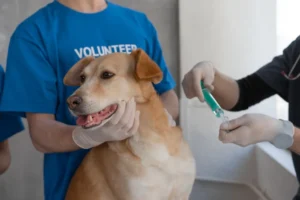Cats are beloved companions, but many owners may not realize the importance of regular vaccinations for their feline friends. One crucial vaccine that all cats need is the rabies vaccine. So, why do cats need rabies vaccine?
Answer: Rabies is a deadly virus that can be transmitted to humans and other animals, making it essential for cats to be vaccinated to protect both themselves and their human families.
What is rabies and how is it transmitted?
Rabies is a viral disease that affects the nervous system of mammals, including cats. It is typically transmitted through the bite of an infected animal, with wildlife like raccoons, bats, and skunks being common carriers. Once the virus enters the body, it travels along nerves to the brain, leading to severe inflammation and eventually death if left untreated.
For cats, the risk of exposure to rabies is particularly high due to their curious and independent nature. They can easily encounter rabid wildlife while exploring outdoors, making it crucial for them to be protected through vaccination. Additionally, indoor cats are not completely safe either, as bats can sometimes find their way indoors, posing a threat of rabies transmission.
It’s important to note that rabies is a zoonotic disease, meaning it can be transmitted from animals to humans. This underscores the significance of ensuring that your cat is vaccinated against rabies to protect both your feline friend and your family from this deadly virus.
What are the symptoms of rabies in cats?
Recognizing the symptoms of rabies in cats is essential for early detection and intervention. Initial signs may be subtle and easily overlooked, resembling common illnesses. However, as the disease progresses, more distinct symptoms may emerge, indicating a more serious condition.
Symptoms of rabies in cats can include behaviors such as aggression, restlessness, and disorientation. Physical signs may include drooling, paralysis, and difficulty swallowing. If you notice any unusual or concerning changes in your cat’s behavior or health, it’s crucial to seek veterinary attention promptly.
Keep in mind that rabies is almost always fatal once symptoms develop, underscoring the importance of preventive measures like vaccination. By staying vigilant and proactive in safeguarding your cat against rabies, you can help ensure their health and well-being for years to come.
Is rabies a common disease in cats?
Rabies is not incredibly common in cats compared to other animals, but it is a significant concern due to the severe consequences it poses for both felines and humans. In the United States, bats are the most common carriers of the rabies virus, and outdoor cats may come into contact with infected animals. Preventing rabies through vaccination is crucial to protect your furry friend and yourself. While the number of reported cases in cats may not be alarming, the potential for exposure is why vaccination is considered a necessary preventive measure.
When should kittens receive their rabies vaccine?
Kittens should receive their first rabies vaccine when they are around 8 to 12 weeks old, with a follow-up booster shot a year later. Early vaccination is key in building immunity and protecting your kitten against the rabies virus. Remember that most states have laws requiring cats to be vaccinated against rabies, so it’s not just about safeguarding your pet but also complying with legal regulations.
Quick Tip: Schedule your kitten’s rabies vaccination alongside their other essential shots, such as distemper and feline leukemia, to streamline their healthcare routine and ensure comprehensive protection. For more information on kitten care and vaccination schedules, check out this resource from the American Association of Feline Practitioners: Kitten Vaccination Recommendations.
Are there any risks associated with the rabies vaccine for cats?
When it comes to rabies vaccines for cats, it’s natural to have concerns about potential risks. However, it’s essential to understand that the risks associated with the rabies vaccine are minimal compared to the vital protection it provides against this deadly virus. Side effects, if they occur, are typically mild and temporary, such as soreness at the injection site or slight fever. These short-term discomforts are far outweighed by the long-term benefits of preventing this life-threatening disease in your feline friend.
Can outdoor cats be more at risk for rabies?
For outdoor cats, the risk of exposure to rabies is significantly higher compared to indoor cats. Outdoor felines are more likely to come into contact with wild animals that may be carriers of the rabies virus, putting them at greater risk of infection. However, this doesn’t mean indoor cats are immune – all cats, regardless of their lifestyle, should be vaccinated against rabies to protect both them and humans from this fatal disease. By ensuring all cats receive the rabies vaccine, you’re safeguarding their health and preventing the spread of rabies within the community.
Additional Tip : If you have an outdoor cat, consider supplementing their rabies vaccine with a regular flea and tick preventative to further reduce the risk of exposure to rabies and other diseases carried by wild animals they may encounter.
How often should cats receive a rabies vaccine?
It is recommended that cats receive a rabies vaccine annually to ensure continued protection against this deadly virus. Regular booster shots are crucial in maintaining your cat’s immunity and keeping them safe from rabies. Remember, prevention is always better than treatment, so staying up-to-date with vaccinations is key to safeguarding your furry friend’s health.
Fun Fact: The first rabies vaccine was developed in 1885 by Louis Pasteur. Louis Pasteur’s groundbreaking work in developing the first rabies vaccine paved the way for modern vaccination practices. This historical tidbit showcases the importance of vaccination in combating deadly diseases like rabies. By staying informed about the history of vaccines, you can better understand the significance of protecting your cat through regular vaccinations.
By following the recommended vaccination schedule and ensuring your cat receives annual rabies vaccines, you are taking a proactive step in protecting both your beloved pet and your family. Remember, a healthy cat is a happy cat, so prioritize their well-being by staying current on their rabies vaccinations.
For more information on the importance of rabies vaccines for cats, you can visit the American Veterinary Medical Association’s official website: AVMA Rabies Vaccination Guidelines.
Alex, a passionate animal lover, has experience in training and understanding animal behavior. As a proud pet parent to two dogs and three cats, he founded AnimalReport.net to share insights from animal experts and expand his knowledge of the animal kingdom.




